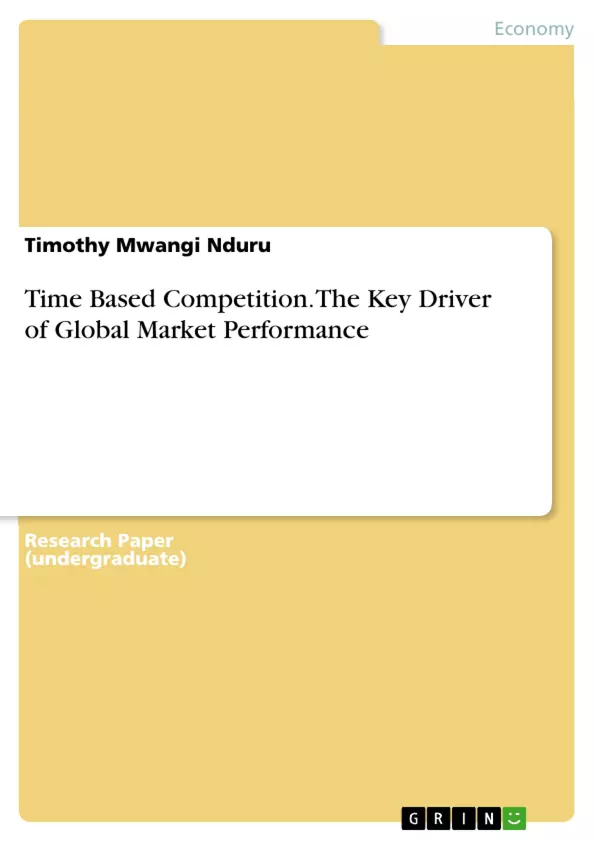Competition is a key driver of global market performance. For many decades’ businesses have been excelling based on the strategy adopted by the management. Notably, the wrong choice of strategy is likely to derail the firm from achieving its potential.
This paper discusses one of the main business strategies that has been warmly embraced in the last decade. Time-based competition has for the past few decades been a key driver of competition in the global market. The paper discusses four main bases of time competition which includes; Product Development and Introduction Time, Material Lead Time, Delivery Time and Throughput Time. Notably, all these time bases for competition affects the global market performance of an organization in different ways. Additionally, the measures needed to determine the effect of time as a basis for competition in global competition has been discussed in details. In determining the effectiveness of the time-based competition as a strategy, the management has to asses several measures. Such measures include profitability, growth in market share, customer’s satisfaction, increased productivity and sales.
Throughout the paper, it is evident that time-based competition is a crucial driver of global market performance as opposed to quality and cost-based competition which are considered to be more of enablers in the business environment than drivers. In summary, time-based competition should be fully embraced by light-minded managers that seek to remain relevant in the competitive global market.
Table of Contents
- Introduction
- Background Information
- Time Based Competition
- Global Market Performance
- The Contribution of Time Based Competition to Global Market Performance
- Product Development and Introduction Time
- Material Lead Time
- Delivery Time
- Throughput Time
- Responsiveness
- Conclusion
Objectives and Key Themes
This paper examines the concept of time-based competition and its influence on global market performance. It analyzes how organizations have adopted this strategy to gain a competitive edge and achieve superior results in a rapidly changing market environment.
- Time-based competition as a key driver of global market performance.
- The role of time reduction in various aspects of business operations.
- The impact of time-based competition on customer satisfaction, productivity, and profitability.
- The challenges and opportunities associated with implementing time-based competition strategies.
- The evolution of competition from cost and quality-based to time-based strategies.
Chapter Summaries
- Introduction: This chapter introduces the concept of time-based competition and its significance in today's global market. It highlights the shift from traditional cost and quality-based competition to a time-centric approach.
- Background Information: This chapter delves into the historical evolution of competition, exploring the transition from price-based strategies to quality-based and ultimately to time-based competition. It discusses the reasons behind this shift and provides examples of companies that have successfully adopted time-based strategies.
- Time Based Competition: This chapter defines time-based competition as a strategy aimed at reducing lead times, throughput times, and delivery times to enhance customer satisfaction. It outlines the key elements of time-based competition and its benefits.
- Global Market Performance: This chapter examines the link between time-based competition and global market performance. It outlines various performance measures such as profitability, productivity, and customer satisfaction, emphasizing the role of time-based competition in achieving these goals.
- The Contribution of Time Based Competition to Global Market Performance: This chapter analyzes how time-based competition contributes to enhanced customer satisfaction, increased market size, higher productivity, and improved profitability. It explores the specific areas where time reduction can have a significant impact, such as product development, material lead time, delivery time, and throughput time.
Keywords
This paper explores the concept of time-based competition as a key driver of global market performance. It examines the role of time reduction in various aspects of business operations and analyzes the impact of this strategy on customer satisfaction, productivity, and profitability. The paper also discusses the evolution of competition from cost and quality-based to time-based strategies, highlighting the challenges and opportunities associated with implementing these approaches.
Frequently Asked Questions
What is Time-Based Competition (TBC)?
TBC is a business strategy that focuses on reducing the time required for all aspects of the business cycle to gain a competitive advantage.
What are the four main bases of time competition?
They are Product Development and Introduction Time, Material Lead Time, Delivery Time, and Throughput Time.
How does TBC impact global market performance?
TBC acts as a driver for profitability, market share growth, customer satisfaction, and increased productivity in the global market.
How is TBC different from quality or cost-based competition?
While quality and cost are considered enablers, time is viewed as a crucial driver that allows firms to remain relevant and responsive.
What measures determine the effectiveness of a TBC strategy?
Management assesses measures such as sales growth, customer responsiveness, and overall organizational productivity.
- Quote paper
- Timothy Mwangi Nduru (Author), 2019, Time Based Competition. The Key Driver of Global Market Performance, Munich, GRIN Verlag, https://www.grin.com/document/457454



